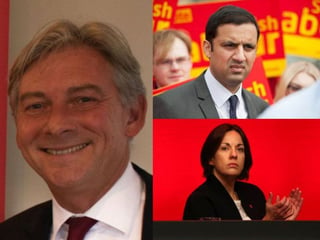Analysis: Labour leadership battle proves far from '˜comradely'


Firstly, the Labour party as a general rule doesn’t seem to ever favour a short campaign – Kezia Dugdale resigned on August 29, yet her successor won’t be in post until November 18.
In contrast, after David Cameron resigned from the post of Prime Minister on June 24, Theresa May was sworn in as Conservative leader on July 13.
Advertisement
Hide AdAdvertisement
Hide AdSecondly, it appears that for all there is a stated desire for contests to be comradely (a ward that only seems to be used in the context of Labour leadership battles), some bitterness is somewhat inevitable.
That has never been more apparent than today, when sparks are starting to fly between the two campaigns.
Here is where we stand just a fortnight into the long campaign.
Early running and gaffes
At first, it appeared that the split in both the parliamentary parties would be the main dividing line in the campaign.
Anas Sarwar commands the support of the majority of MSPs, while his opponent Richard Leonard has most MPs onside (the latter group number only 7, while there are 23 MSPs).
While some expected that Anas Sarwar’s personal circumstances might come to the fore at some point, few thought it would become almost the sole focal point of the initial campaign.
The decision to send his children to a private school has hardly featured, with bitter rows over his business interests dominating the early stages of the debate.
Most of the attacks on Mr Sarwar have been external, and Mr Leonard, for his part, hasn’t overtly criticised his opponent.
Advertisement
Hide AdAdvertisement
Hide AdIn truth, much of the damage that has hit the Sarwar campaign has been self-inflicted, with haughty responses to reasonable questions, and even a Trump-esque attack on “The SNP and their friends in the media”.
The long campaign could afford Mr Sarwar the chance to draw line under questions about his family business, especially after divesting his shares.
“Internal plot”
Part of a potential rebrand for Mr Sarwar, as he sees himself now as the outsider in a race he was odds-on to win, could be to cast himself as a Corbyn style insurgent.
A hint of this was evident during today’s row, after interim leader Alex Rowley was overheard at Labour’s conference expressing a preference for Mr Leonard, and suggesting he knew Kezia Dugdale wouldn’t lead Labour into the next election.
Anas Sarwar’s campaign reacted with fury, with accusations of a ‘plot’ flying, and Jackie Baillie accusing elements of the party ‘establishment’ of trying to stitch up the race.
The Dumbarton MSP, who is backing Anas Sarwar, said that Mr Rowley had serious questions to answer.
The Leonard campaign, abandoning all sense of ‘comradely’ rebuttal, e-mailed a journalist on the issue who revealed on Twitter that the subject line read “comment on Jackie Baillie’s latest p*sh.”
The future
With a long way to go, it certainly seems from today’s bitter infighting that the campaign to lead the third party in the Scottish Parliament is hotting up.
Advertisement
Hide AdAdvertisement
Hide AdJeremy Corbyn, whose own personal politics would more naturally align with those of Mr Leonard, has remained aloof from the contest, pledging today to work with whoever wins.
SNP activists and politicians, never knowingly inclined to be comradely towards their bitter rivals in Labour, have reacted with barely concealed glee at the early travails of Mr Sarwar, and latterly those of Mr Rowley, and by extension, the candidate he is privately supporting.
With Mr Sarwar pledging to ensure a ‘gender balanced leadership team’, Mr Rowley’s authority in the future could already be considered in doubt.
His part in today’s bitter row could mean that even if Richard Leonard, the slight bookmakers’ favourite, wins, he could still find himself sidelined.
However, with six weeks until a new leader is crowned, and a contest that is far from ‘comradely’, Mr Rowley’s reputation for fairness might not be the only collateral damage in this race.
